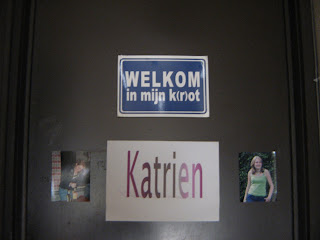I found a place for 205 Euros per month, all in. Out of the eight places I had already seen, this was by far the cheapest, and none of the others gave me a private shower and 3 metres of windows looking out over the rooftops of the city. The views of most kamers (rooms) are limited to the building on the other side of the street.

I first found the place as I was walking down Tiensestraat looking for signs that said, "Kamer te huur". Smelling the warm, yeasty scent of a bakery, I noticed in the window just such a sign. And so I inquired within, taking note of that scent that I would smell every morning for the next 11 months. When I asked for a viewing, the woman behind the counter gave me a set of keys and in broken English instructed me to go to the top floor, that she could not come up with me and tend to her shop at the same time. By the time I reached the room, I understood that the 75 stairs may have been a factor in her choice to stay in the shop. The stairwell had water damage and some mould... not a good sign. But it was clear that work was being done, for the thick wallpaper was being stripped off for future replacement. There were three things that I first noticed when I entered the room. First, it was a dusty mess. Second, the floor is so sloped that it takes my skateboard 2.3 seconds to roll from one side of the room to the other. The third thing, however, put all other concerns into perspective: a large desk facing a span of windows 3 metres long. From this new writing desk I could look out over the city of Leuven and contemplate.

Only two doors down from me is a small supermarket with everything I need for day-to-day provisions. Good thing, too, for I have no kitchen and no fridge or freezer. I shall purchase a hotplate or an electric grill, and buy fresh food daily. Hopefully this will in fact help me save, since I will never be able to hoard and always know the cost of each individual meal. Living cheap is a life skill. Gotta practice it as much as possible.
My second day in Leuven, I had found a perfect place for myself. Hem duril'a. That day I had already went through the aggravating process of registering as a student at the university. But the biggest task of the day was carrying two large luggage bags weighing 23 kg each from the hostel to the stairwell. This 20 minute portage was not extremely enjoyable. I dragged them through a construction zone, a train station tunnel, and down 3 blocks on the ringroad. Then came the 75 stairs. After getting my bags up into the room, I sighed in relief, hem duril'a.
There was much to be done, however. The room was a dust pool, and so I set about the three hour task of dusting and sweeping to every corner. By the end I had collected a veritable mountain of dust.

But finally I could remove my scarf from my face and breath easy in this room that through my labour had become more of a home to me. Since then I have cleaned the shower and the sink, the windows and mirror, and all the furniture. I have purchased a rug for outside my shower door to prevent water from spreading to other areas in my room. Aside from that, I have placed in the room many posters, a degree, and an opened box of Kellogg's Smacks. The nesting process is nearing completion.
My place, as I have explained, is in a very convenient location. Not only am I near stores and bars, but I am less than ten minutes from both the philosophy department and the skatepark. Let's just say I've decided it's worth my 205 Euros per month. With the first month and security deposit made, all I have left to do is meet the neighbors...












